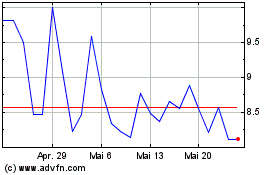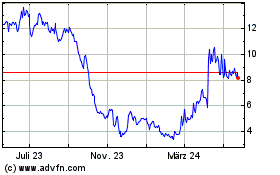Acrivon Therapeutics Reports Positive Endometrial Cancer Data from Ongoing ACR-368 Registrational Intent Phase 2 Study at ESMO, Advancement of ACR-2316 into Clinic Ahead of Timelines, and Progress on its AP3 Interactome for Proprietary Data Analysis
14 September 2024 - 9:10AM

Acrivon Therapeutics, Inc. (“Acrivon” or “Acrivon Therapeutics”)
(Nasdaq: ACRV), a clinical stage precision medicine company
utilizing its Acrivon Predictive Precision Proteomics (AP3)
platform for the discovery, design, and development of drug
candidates through a mechanistic match to patients whose disease is
predicted sensitive to the specific treatment, today presented
additional positive clinical data at ESMO from the ongoing
registrational intent, multicenter Phase 2 trial of ACR-368 in
patients with locally advanced or metastatic, recurrent endometrial
cancer. The company has also disclosed that the Investigational New
Drug (IND) application for its next clinical candidate, ACR-2316,
has been cleared by the FDA with initial clinical sites now
activated, and first-in-human dosing for the Phase 1 study expected
in the fourth quarter of 2024.
“We are very excited to provide several significant, positive
updates across our rapidly advancing clinical pipeline since our
last R&D event in April,” said Peter Blume-Jensen, M.D., Ph.D.,
chief executive officer, president, and founder of Acrivon. “First,
at ESMO earlier today, we presented an updated interim efficacy and
safety data cut of our registrational intent ACR-368 Phase 2 study,
which showed a confirmed ORR of 62.5% in endometrial cancer
patients. Notably, endometrial cancer is a tumor type that we
predicted to be sensitive to single agent ACR-368 with our AP3
indication finding screening approach which we have now confirmed
in the clinic. The maturing data is particularly encouraging as the
lower bound of the 95% confidence interval is now 30%, above our
targeted goal for this metric. Moreover, while median duration of
response has not yet been reached, it is now approximately 6 months
with all responding patients on therapy at time of data cut-off.
Given the strength of the data we believe endometrial cancer might
provide the first potential approval opportunity for ACR-368. We
are actively evaluating potential confirmatory trial designs,
including front line, for a potential future label expansion. We
are also excited to disclose that the FDA has cleared the IND for
our second clinical program, ACR-2316, well ahead of original
timeline projections. Clinical trial sites have been activated and
are now actively screening patients for enrollment into a Phase 1
study. Today’s update further strengthens the validation of our
prospective OncoSignature patient selection method and of our
differentiated AP3 platform delivering actionable data across
discovery and development.”
ACR-368 Updates and Highlights
- Presented data at ESMO from the
ongoing, registrational-intent, multicenter Phase 2 trial of
ACR-368 in patients with high grade endometrial cancer.
Importantly, all patients enrolled must have progressed on prior
anti-PD-1 therapy, unless ineligible. The data were based on 35
safety-evaluable subjects, of which 23 (8 BM+ and 15 BM-) were
efficacy-evaluable with at least one on-treatment scan (data cut
off July 25, 2024).
- Reported a confirmed ORR (RECIST
1.1) of 62.5% (95% CI, 30.4-86.5) observed in the cohort of
prospectively-selected OncoSignature-positive (BM+) patients who
were efficacy-evaluable. Endometrial cancer is a tumor type that
was predicted to be sensitive to ACR-368 by AP3-enabled indication
screening before any clinical data was generated.
- Median duration of response (mDOR)
was not yet reached (~6 months at time of data cut-off); all
responding patients still on therapy
- Best overall response (BOR) in last
prior line predominantly progressive disease (PD) in confirmed
ACR-368 responders
- Confirmed responses were observed
across molecular and histological subtypes
- Demonstrated the ability of the
AP3-based ACR-368 OncoSignature assay to prospectively predict
patients sensitive to ACR-368 monotherapy based on updated data
that showed a clear segregation of responders in the BM+ versus
OncoSignature-negative (BM-) arms (p-value = 0.009)
- Observed further evidence of
sensitization to ACR-368 by ultra-low dose gemcitabine (ULDG) in a
proportion of BM- subjects, with an initial disease control in 8
out of 15 subjects, including 1 confirmed complete response
(CR)
- Consistent with past trials and earlier reported data from this
trial, the ACR-368 treatment-related adverse events observed were
limited, predominantly transient, reversible, mechanism-based
hematological AEs, which typically occurred during the first 1-2
cycles of therapy. There was a notable absence of long-lasting
myelosuppression, or the typical more severe non-hematological AEs
commonly seen with ADCs and chemotherapy.
- Company conducted a blinded
third-party KOL market research study which showed strong interest
in the emerging clinical profile of ACR-368 (product name blinded)
as an important potential therapy in the rapidly evolving treatment
landscape of endometrial cancer where second line options are now
limited due to anti-PD-1 and chemotherapy having been approved in
front line therapy
- An estimated ~30K new cases of
high-grade, locally advanced or metastatic, recurrent (progressed
on anti-PD-1 and chemotherapy) endometrial cancer per year
- ~90% of these patients will
progress to second line
- The recent approval of
pembrolizumab plus chemotherapy as a first-line treatment leaves a
significant unmet need in the second-line, where the bar from
reported chemotherapy efficacy in second-line is an ORR of 14.7%
and mPFS of 3.8 months (Makker et al; N Engl J Medicine, 2022)
- The ESMO poster presentation is
available on Acrivon’s website in the “Science and Publications”
section
ACR-2316 Updates
- The company today disclosed that
the FDA has cleared the IND for its novel, dual WEE1/PKMYT1
inhibitor ACR-2316, ahead of projected timelines
- Multiple clinical sites have been
activated for the Phase 1 dose optimization study
- Initial patient dosing expected in
fourth quarter 2024 in selected tumor types
AP3 Interactome Updates
- Proprietary, computational
analytics platform leveraging machine learning now further advanced
for integrated comprehensive analyses across all large, in-house
AP3 phosphoproteomic drug profiling data sets.
- Integration enables quantitative
analyses to generate actionable insights for rational drug design,
predictive biomarkers, resistance mechanisms, and indication
finding to be implemented in the clinic
- AP3 Interactome has been deployed
to enable indication finding and patient responder identification
for ACR-368 and to generate the novel dual WEE1/PKMYT1 inhibitor
ACR-2316
Company Webcast and KOL Participation
The company will host a webcast today, Saturday, September 14 at
9:00 a.m. ET to further discuss these data and pipeline updates. A
link to the webcast can be found on the investors page of
www.acrivon.com.
In addition to company executives, Ramez N. Eskander, M.D.,
assistant professor of Obstetrics, Gynecology, and Reproductive
Sciences, University of California, San Diego, CA, a key opinion
leader in endometrial cancer will participate in the webcast. Dr.
Eskander is the lead author on the influential paper “Pembrolizumab
plus Chemotherapy in Advanced Endometrial Cancer” (N Engl J Med
(2023) 388(23):2159-2170).
About Acrivon Therapeutics Acrivon is a
clinical stage biopharmaceutical company developing precision
oncology medicines that it matches to patients whose tumors are
predicted to be sensitive to each specific medicine by utilizing
Acrivon’s proprietary proteomics-based patient responder
identification platform, Acrivon Predictive Precision Proteomics,
or AP3. The AP3 platform is engineered to measure compound-specific
effects on the entire tumor cell protein signaling network and
drug-induced resistance mechanisms in an unbiased manner. These
distinctive capabilities enable AP3’s direct application for drug
design optimization for monotherapy activity, the identification of
rational drug combinations, and the creation of drug-specific
proprietary OncoSignature companion diagnostics that are used to
identify the patients most likely to benefit from Acrivon’s drug
candidates. Acrivon is currently advancing its lead candidate,
ACR-368 (also known as prexasertib), a selective small molecule
inhibitor targeting CHK1 and CHK2 in a potentially registrational
Phase 2 trial across multiple tumor types. The company has received
Fast Track designation from the Food and Drug Administration, or
FDA, for the investigation of ACR-368 as monotherapy based on
OncoSignature-predicted sensitivity in patients with
platinum-resistant ovarian or endometrial cancer. Acrivon’s ACR-368
OncoSignature test, which has not yet obtained regulatory approval,
has been extensively evaluated in preclinical studies, including in
two separate, blinded, prospectively-designed studies on
pretreatment tumor biopsies collected from past third-party Phase 2
trials in patients with ovarian cancer treated with ACR-368.
The FDA has granted Breakthrough Device designation for the
ACR-368 OncoSignature assay for the identification of ovarian
cancer patients who may benefit from ACR-368 treatment. In addition
to ACR-368, Acrivon is also leveraging its proprietary AP3
precision medicine platform for developing its
co-crystallography-driven, internally-discovered pipeline programs.
These include ACR-2316, the company’s second clinical stage asset,
a potent, selective WEE1/PKMYT1 inhibitor designed for superior
single-agent activity as demonstrated in preclinical studies
against benchmark inhibitors. The company is also progressing
internally- developed preclinical programs, including a cell cycle
program with an undisclosed target.
Forward-Looking Statements This press release
includes certain disclosures that contain “forward-looking
statements” within the meaning of the Private Securities Litigation
Reform Act of 1995 about us and our industry that involve
substantial risks and uncertainties. All statements other than
statements of historical facts contained in this press release,
including statements regarding our future results of operations or
financial condition, preclinical and clinical results, business
strategy and plans and objectives of management for future
operations, are forward-looking statements. In some cases, you can
identify forward-looking statements because they contain words such
as “anticipate,” “believe,” “contemplate,” “continue,” “could,”
“estimate,” “expect,” “intend,” “may,” “plan,” “potential,”
“predict,” “project,” “should,” “target,” “will,” or “would” or the
negative of these words or other similar terms or expressions.
Forward-looking statements are based on Acrivon’s current
expectations and are subject to inherent uncertainties, risks and
assumptions that are difficult to predict. Factors that could cause
actual results to differ include, but are not limited to, risks and
uncertainties that are described more fully in the section titled
“Risk Factors” in our reports filed with the Securities and
Exchange Commission. Forward-looking statements contained in this
press release are made as of this date, and Acrivon undertakes no
duty to update such information except as required under applicable
law.
Investor and Media Contacts: Adam D. Levy,
Ph.D., M.B.A.alevy@acrivon.com
Alexandra Santos asantos@wheelhouselsa.com
Acrivon Therapeutics (NASDAQ:ACRV)
Historical Stock Chart
Von Okt 2024 bis Nov 2024

Acrivon Therapeutics (NASDAQ:ACRV)
Historical Stock Chart
Von Nov 2023 bis Nov 2024


